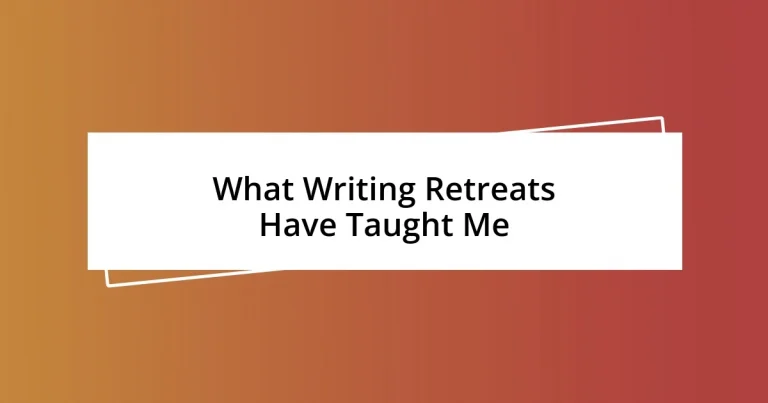Key takeaways:
- Writing retreats promote deep focus and creativity by providing a supportive environment that encourages vulnerability and authentic idea exchange.
- A balance of solitude and community enhances the retreat experience, fostering connections and inspiration among diverse writers.
- Key lessons from retreats include the importance of community support, self-discipline in writing, and the value of vulnerability in sharing personal work.
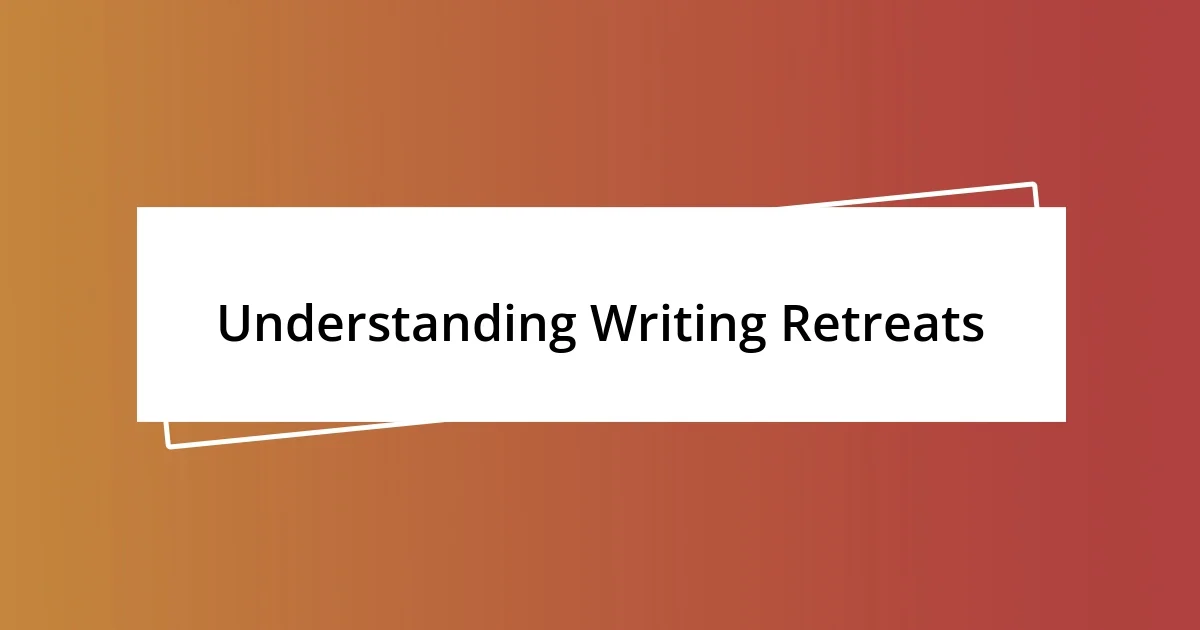
Understanding Writing Retreats
Writing retreats are more than just a change of scenery; they are transformative experiences that encourage deep focus and reflection. I remember the first retreat I attended—I was nervous yet excited, surrounded by strangers who shared a passion for writing. It struck me how the collective energy fostered creativity and motivated us to dive into our projects wholeheartedly.
As I sat in that cozy cabin, a beautiful landscape outside my window, I understood that disconnecting from everyday distractions can lead to profound insights. I found myself tapping into emotions I hadn’t explored in my writing, discovering layers of my characters I previously overlooked. Isn’t it fascinating how a shift in environment can unlock hidden potential within us?
These retreats often include workshops and communal sharing, which provide invaluable feedback and fresh perspectives. I’ll never forget the moment when a fellow writer shared a piece that resonated deeply with my own struggles. It reminded me that we all have stories to tell and that in a supportive environment, our vulnerabilities can transform into strengths. Have you ever found your voice in places you least expected? That’s the magic of writing retreats—they nurture an authentic exchange of ideas among writers.
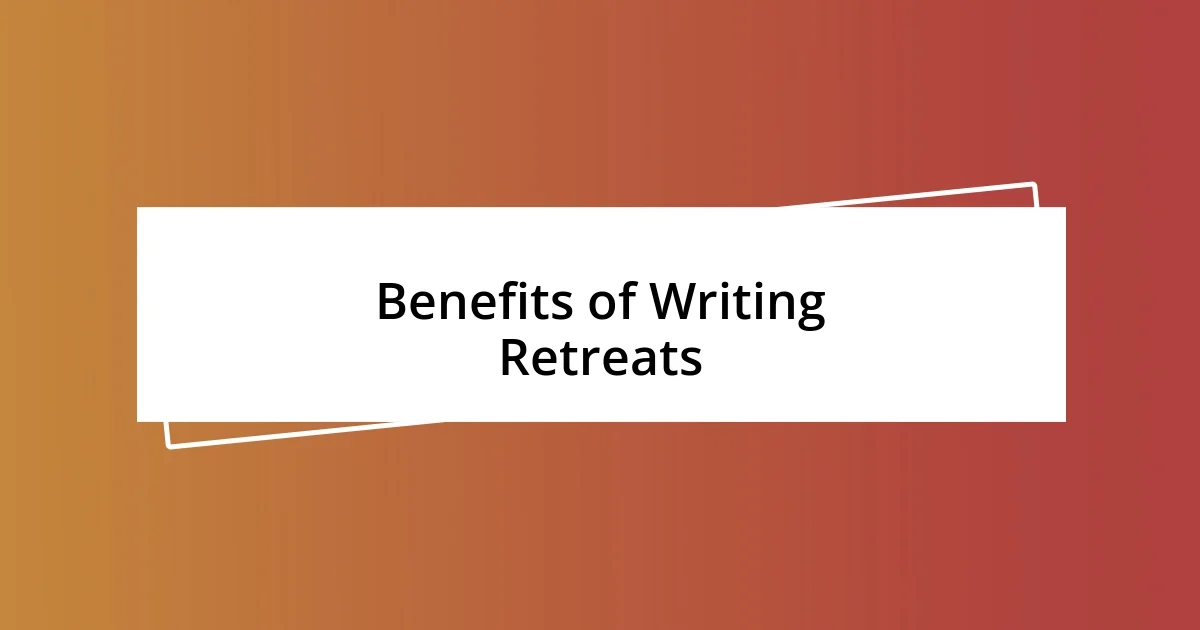
Benefits of Writing Retreats
The benefit of writing retreats lies in their ability to cultivate a centered environment. I recall a moment during my last retreat when I set my intention for the day. With no phone buzzing or deadlines looming, I was able to dive deeply into my work. It felt refreshing to reconnect with my writing on such an intimate level. For anyone struggling to carve out time for creativity, this kind of focused space can be invaluable.
Another crucial advantage is the chance to connect with other writers. At each retreat, I’ve encountered individuals whose backgrounds and stories were vastly different from mine. Sharing meals and engaging in lively discussions sparked inspiration and broadened my understanding of diverse writing styles. It reminded me of the importance of community in the creative process—sometimes, the best ideas come from listening to someone else’s journey.
Lastly, the structured workshops and guided exercises provided by retreats can spark newfound creativity. I remember attending a session focused on overcoming writer’s block. The prompts given were simple yet powerful, and they nudged me out of my comfort zone. Like the time I wrote a poem about a seemingly mundane moment that suddenly felt significant. When I shared it later, the feedback brought unexpected encouragement, pushing me to explore deeper themes in my narratives. This blend of guidance and support is what makes writing retreats truly special.
| Benefit | Personal Insight |
|---|---|
| Focused Environment | Facilitates deep connection with your writing. |
| Community | Encourages inspiration and collaboration among diverse writers. |
| Structured Workshops | Sparks creativity and helps overcome obstacles like writer’s block. |
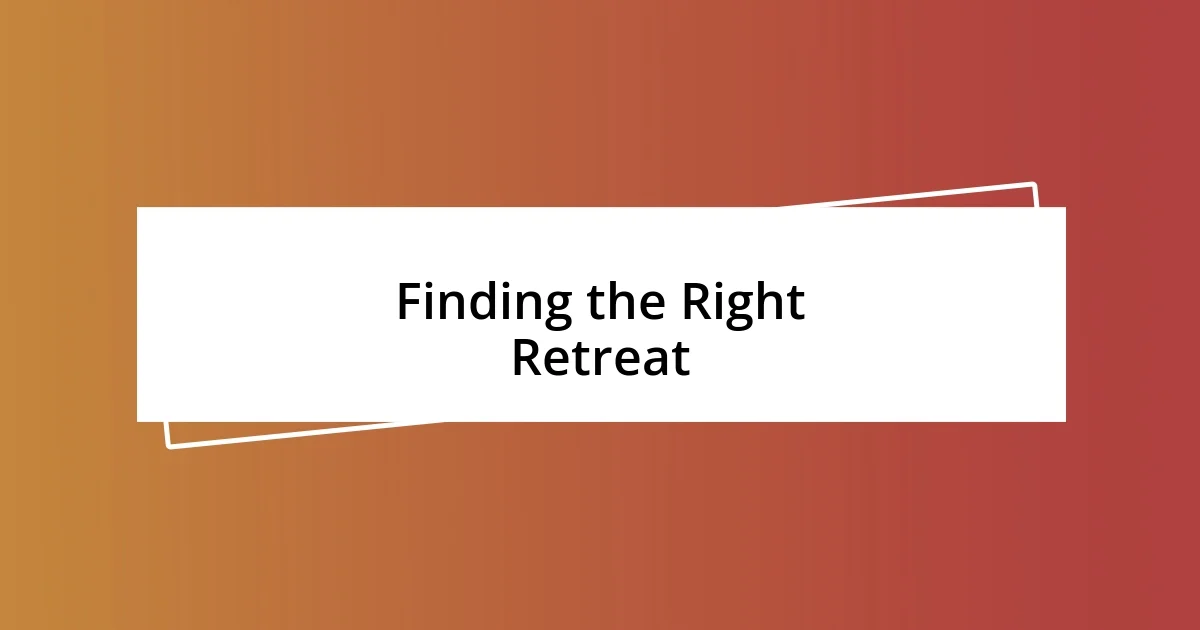
Finding the Right Retreat
Finding the right writing retreat can feel overwhelming, especially with so many options out there. From personal experience, it’s essential to consider what environment resonates with you. For instance, I’ve gravitated toward retreats that offer both solitude and community. The balance can be just right; sometimes, I yearn for a quiet nook to pen my thoughts, while other times, sharing meals with fellow writers fills my creativity with joy.
Here are some critical aspects to consider when searching for your ideal retreat:
- Location: Think about what inspires you—mountains, beaches, or perhaps a cozy library setting.
- Purpose: Are you looking to finish a specific project, explore personal writing goals, or network with other writers?
- Facilitators: Investigate the backgrounds and styles of the facilitators; their expertise should align with your writing needs.
- Size: Consider how many participants you’re comfortable with. Intimate groups can foster deeper connections, while larger gatherings may offer more diverse perspectives.
- Activities: Ensure the retreat includes activities that engage you, whether it’s guided workshops, group critiques, or quiet reflection time.
Reflecting on my own journey, I recall finding a retreat nestled in the serene woods, which not only nourished my soul but also allowed me to connect with writers who challenged my perspectives. It was the perfect blend of guidance, discussions, and moments of solitude, which ignited a fire in my writing that I didn’t know I had. This personal resonation is what led me to choose a retreat that felt like a second home; it truly made all the difference.
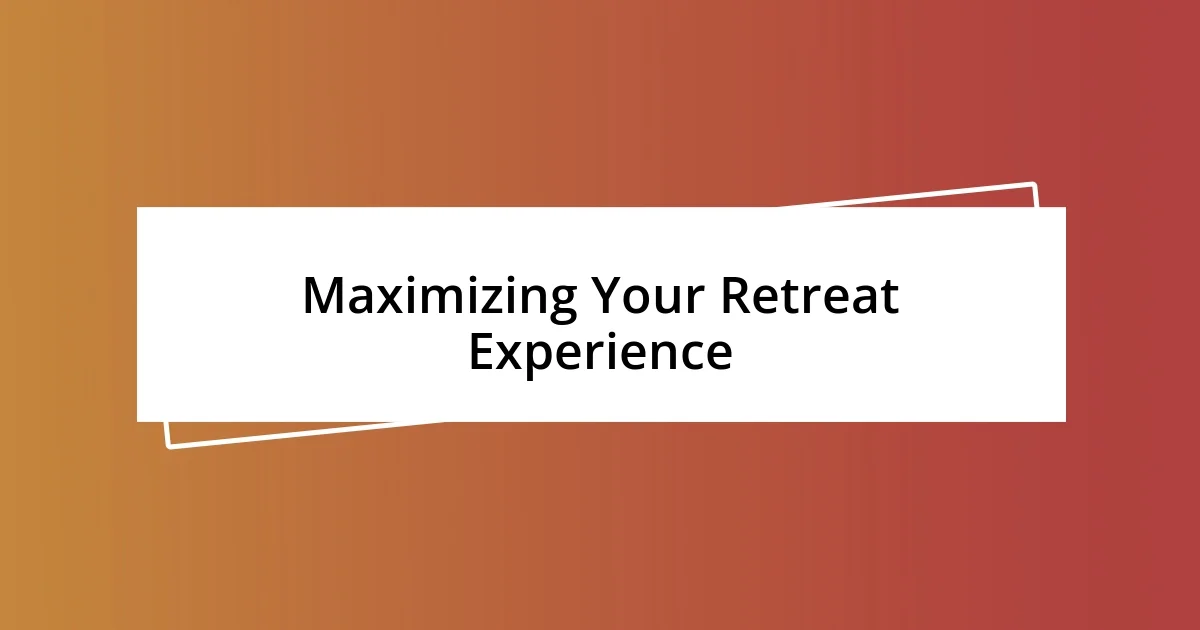
Maximizing Your Retreat Experience
To maximize your retreat experience, I recommend coming prepared with clear writing goals. For example, during one retreat, I aimed to tackle a chapter I had been avoiding. With that focus, I could channel my energy into that specific task, and the result was immensely satisfying. Isn’t it empowering to walk away from a retreat with tangible progress?
Another strategy is to fully embrace vulnerability. On one occasion, I shared a piece that I had hesitated to present because of its rawness. The support and encouragement I received from fellow participants transformed my anxiety into a sense of belonging. Have you ever let down your guard in a creative setting? It can lead to profound connections and unexpected insights.
Lastly, don’t forget to carve out time for reflection. I often journal at the end of each day, noting what resonated with me and what I hope to integrate into my writing practice. This simple act allows me to synthesize my experiences and intentions, making the lessons from the retreat linger long after it concludes. How do you usually process your experiences? Finding that personal ritual can truly enhance your retreat journey.
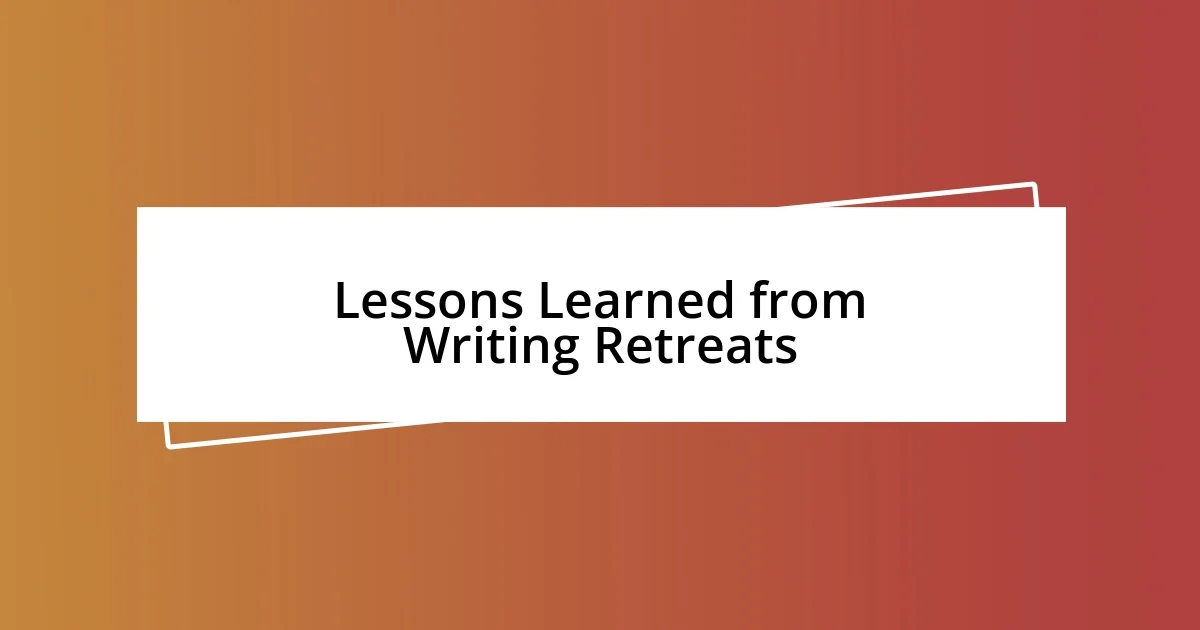
Lessons Learned from Writing Retreats
Writing retreats have imparted some invaluable lessons that continue to influence my approach to creativity. One significant takeaway is the importance of community support. I remember a particular moment when I received unexpected praise for a piece I’d presented. The appreciation felt like a warm embrace, filling me with encouragement. It made me realize how powerful it is to surround yourself with like-minded individuals who genuinely celebrate one another’s journeys. Have you experienced that kind of uplifting environment in your own writing endeavors?
Another lesson revolves around the art of self-discipline. During a retreat, I set aside my usual distractions and dedicated time solely to writing. It was a refreshing change. I didn’t just write; I was experiencing a focused flow that opened up new avenues for creativity. I often ponder—how can we replicate that feeling of immersion in our daily lives? It’s a reminder to create structured time blocks for writing, making the process feel less like a chore and more like a privilege.
Lastly, I learned firsthand the value of vulnerability in sharing one’s work. At a past retreat, I hesitated to read a deeply personal essay about a struggle I’d faced. When I finally mustered the courage, the room fell silent, and the genuine feedback I received swept over me like a wave of relief. It reminded me how important it is to take risks, to share our truths, and to connect with others on that raw, emotional level. Isn’t it fascinating how much we grow when we allow ourselves to be seen? These experiences have reshaped how I approach both writing and sharing, making me more open to exploration and authenticity.












